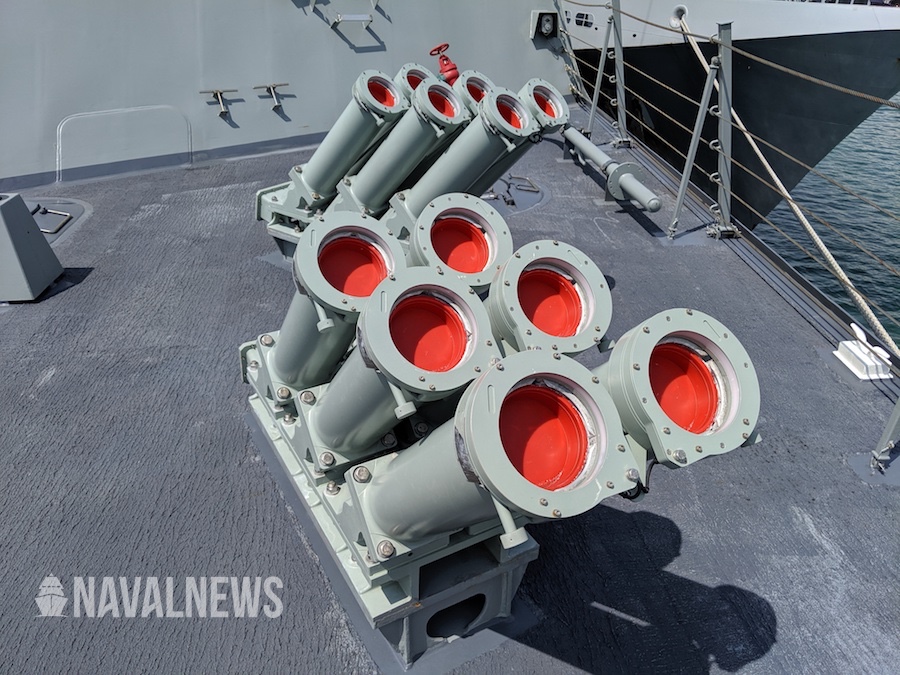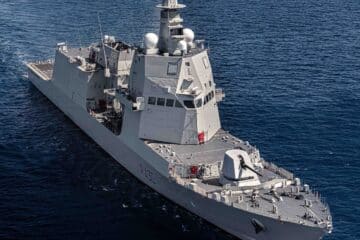Terma press release
The process has been far from conventional. Typically, readying a comprehensive CMS for any navy vessel involves several meetings where specifications and expectations are aligned across the organizations involved. However, with COVID-19 restrictions in place, much of the collaboration has moved online, including the four Factory Acceptance Tests (FAT).
Among other things, Terma is contracted to deliver the CMS for the four KCR-60 vessels. Not being able to meet in person has been a challenge, however, the program and the FAT approvals were kept on schedule to the full satisfaction of the customer and project team at both Terma and the Indonesian shipyard, PT PAL.
PT PAL holds the primary contract for building and delivering the four vessels – two are new builds and two are existing fast attack crafts undergoing a complete upgrade.
Handheld Video Demo Made Fat Possible
The four FATs were conducted virtually as so-called “demo FAT’s” towards the end-user.
In practice, Terma had performed and completed the full and whole Factory Acceptance Test prior to the actual virtual demo FAT event. Terma’s internal quality representative witnessed and signed off that the result of the Factory Acceptance Test lived up to expectations.
During the virtual demo FATs, Terma presented an array of topics selected prior to the event. The topics were explained thoroughly via a Microsoft Teams meeting using handheld cameras.
While the two first demo FATs were conducted entirely online, COVID-19 restrictions allowed for in-person attendance at the last two by a London-based and a Berlin-based Indonesian defense attaché respectively.
“I’m very proud that we were able to finish the factory acceptance tests on time, and I’m thankful that both the Indonesian Ministry of Defense, Navy and PT PAL has been very understanding and flexible despite the COVID-19 challenges,” Head of Indonesia Programs at Terma, Mr. Per Boye Ovesen, says.
Terma acts as a combat system integrator and is responsible for integrating all sensors and effectors onboard the vessels. Furthermore, Terma is contracted to deliver: the C-Flex combat management system, the C-Guard decoy launching system, the C-Fire fire control system, and SCANTER 4603 air & surface surveillance radar for all four KCR-60 vessels.
Ready For Sea Acceptance & Live Firing Test
2022 will be a year of execution and with the acceptance tests approved, on-site installation begins.
“As we speak, the final shipment for the combat management system no. 4 is on its way to Indonesia. Our local team has already begun installations and soon the sensor and weaponry into the C-Flex System of the KCR-60s will come.”
Mr. Per Boye Ovesen, Head of Indonesia Programs at Terma
All four fast attack crafts are expected to be ready for sea acceptance and live firing tests during 2022. The first test is scheduled in July-August and even though COVID-19 is creating obstacles for the cross-border collaboration, Per Boye Ovesen is certain that the partnership with PT PAL and the Indonesian Navy will continue to be as smooth and fruitful as it has been so far.
Empowering Strong Partnerships Through Local Presence

To ease operations, Terma has established local offices and employed local staff in both Jakarta and Surabaya, where the vessels are built, with the aim to bring competencies and know-how closer to the shipyard.
The local presence is necessary to ensure a smooth collaboration when regular cross-border partnerships are made difficult by the pandemic. By bringing competencies closer to the shipyard, Terma and PT PAL have created the optimal conditions for ensuring a high-quality build that stays on schedule.
However, implementing a new combat management system is a complex task.
“As the responsible systems integrator, we must ensure that all systems work smoothly together and provide the necessary situational awareness, decision support and ultimately control the different weapons systems onboard,” Per Boye Ovesen explains.
When completed, the KCR-60 crafts will be equipped with surveillance, ESM, and IFF systems as well as guns, missile launchers, and decoy systems.
The Importance Of Maritime Power In The Asia-Pacific
While this is Terma’s first larger CMS program in Indonesia, the Danish company has already delivered Combat Suites for other countries in the Asia-Pacific region such as Brunei, Thailand, and Australia. More than 10 Navies and Coast Guards in the region rely on Terma’s naval solutions including C-Flex CMS, SCANTER radars, and C-Guard Decoy Launching System.

From a naval point of view, the Asia-Pacific region is quite remarkable. With the region boasting some of the world’s longest coastlines, and with countries stretching over vast bodies of water, the need for comprehensive maritime capabilities is critical for protecting against violation of territories and economic exclusion zones.
With the planned fast attack crafts adding more speed, agility, and firepower to the Indonesian navy, the country will improve its ability to secure territorial sovereignty in the waters surrounding its more than 17,000 islands.






